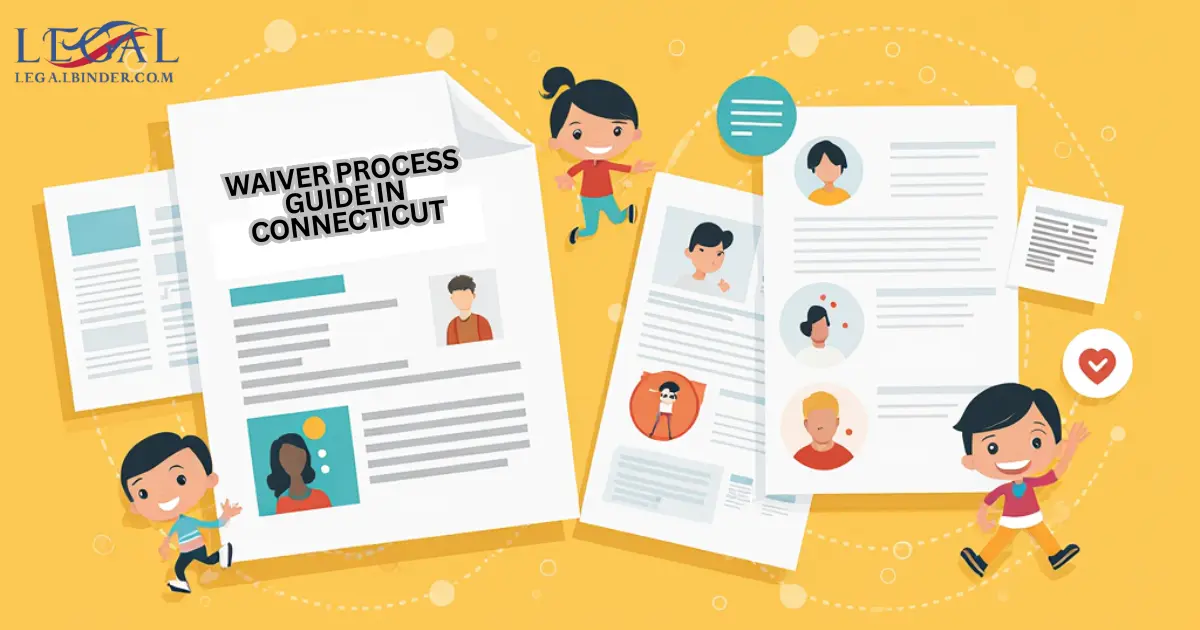waiver Connecticut — If you’re unable to pay court or administrative fees in Connecticut, this clear 2025 guide explains how to prepare and file a waiver request. You’ll learn eligibility tests, the specific Connecticut Judicial Branch forms to use, step-by-step filing instructions, typical processing times, and where to download official state resources.
This article is Connecticut-specific — follow these steps to avoid delays and increase your chance of approval in Connecticut courts and agencies.
Quick overview — what this Waiver Connecticut covers
A waiver in Connecticut asks the court or state agency to excuse payment of filing fees, transcript charges, copying costs, or appellate fees when payment would create undue hardship. Courts may grant full waivers, partial waivers, or permission to proceed in forma pauperis depending on the facts.
Typical waiver requests in Connecticut include:
- Waiver of civil filing fees (Superior Court, small claims where applicable).
- In forma pauperis requests for appeals to the Appellate Court or Supreme Court.
- Fee relief for transcripts, certified copies, or administrative filings.
State-specific Requirements (waiver Connecticut)
Connecticut judges apply state statutes and court rules when deciding waivers. The court will review your sworn affidavit, evidence of public benefits (e.g., HUSKY/Medicaid), income, assets, household size, and necessary expenses.
Key Connecticut resources to consult:
Filing location: file your waiver with the clerk of the Connecticut court handling your case (Superior Court or appellate clerk). For agency fee waivers, follow the specific agency’s published process on CT.gov.
Eligibility indicators in Connecticut
- Receiving HUSKY (Medicaid), SNAP, or other means-tested benefits strongly supports indigency.
- Low household income combined with unavoidable expenses (rent, utilities, medical) may qualify even if you don’t receive benefits.
- Incarcerated persons and pro se appellants should use appellate in forma pauperis procedures for appeals.
Step-by-step how to complete & submit (file waiver Connecticut)
Follow these steps to assemble a complete waiver Connecticut filing packet.
- Download the correct Connecticut form. Use the Connecticut Judicial Branch forms page to find the affidavit of indigency, in forma pauperis motion, or the specific Superior Court waiver form. Counties occasionally use local attachments—check the clerk’s page.
- Collect supporting documents. Gather recent pay stubs, benefit award letters (HUSKY/Medicaid, SNAP), bank statements for the last 1–3 months, a valid ID, and documentation of essential expenses.
- Complete the affidavit thoroughly. Include household members, all income sources, monthly expenses, assets, and any extraordinary obligations. Be precise—courts verify information.
- Sign under oath and notarize if required. Connecticut forms typically require a sworn statement; follow notarization or clerk-signature instructions exactly.
- Attach corroborating evidence. Add copies (not originals) of benefit letters, pay stubs, bank statements, and bills to substantiate your claims.
- File with the clerk. Submit the packet to the Superior Court clerk or appropriate appellate clerk in person, by mail, or via e-filing where available. Request a filed-stamped copy for your records.
- Monitor the docket and attend any hearing. Some judges decide on paper; others may schedule a short hearing. Attend promptly and bring originals if requested.
Connecticut courts commonly require these items with a waiver request:
- Affidavit of Indigency or Motion to Proceed In Forma Pauperis (download from Connecticut Judicial Branch forms).
- Proof of public benefits (HUSKY/Medicaid, SNAP) when applicable.
- Recent pay stubs or employer income verification and bank statements.
- Copies of essential monthly bills (rent/mortgage, utilities, medical).
- State-issued ID and copies of case pleadings or appeal notices.
Processing time, fees and deadlines Waiver Connecticut
There is usually no charge to file a waiver in Connecticut. Processing times vary by court and judge.
- Processing: Clerks forward affidavits to judges; decisions commonly take several days to a few weeks.
- Fees: Filing the waiver is free. If denied, you must pay any required fees to proceed.
- Deadlines: File the waiver with your initial pleading or before appeal deadlines to preserve appellate rights—late waivers can jeopardize your case.
Common mistakes to avoid Waiver Connecticut
- Using an outdated form — always download the current PDF from the Connecticut Judicial Branch.
- Failing to attach supporting evidence like benefit letters or pay stubs.
- Leaving required fields blank or providing inconsistent figures across documents.
- Filing in the wrong court or without the correct case number.
- Not keeping a filed-stamped copy of your submission for proof of filing.
Authoritative Connecticut resources for forms and guidance:
FAQs
A: Use the Affidavit of Indigency or Motion to Proceed In Forma Pauperis available on the Connecticut Judicial Branch forms page. County clerks may have local attachments—confirm with the clerk.
Q: Will receiving HUSKY (Medicaid) automatically get my waiver approved?
A: Receiving HUSKY is strong evidence of inability to pay, but the judge reviews the full financial picture before granting relief.
Q: Can I request a waiver of appellate fees in Connecticut?
A: Yes. File the appellate in forma pauperis motion with the appellate clerk before the appeal deadline to request fee relief for appeals.
Q: What happens if my waiver is denied?
A: If denied, you must pay the required fees to proceed. You can seek legal aid, refile with additional evidence, or consult an attorney about next steps.
A: Contact your county Superior Court self-help services, UConn Law clinics, or Connecticut legal aid organizations for assistance if you qualify.
Conclusion & CTA
Following the waiver Connecticut process in this guide—using the correct affidavit form, attaching clear supporting documents, and filing in the proper court—will strengthen your request for fee relief. Start by downloading the official forms from the Connecticut Judicial Branch, collect benefit letters and pay stubs, and file promptly with the clerk handling your case.
For official Connecticut forms and county clerk contacts, visit the Connecticut Judicial Branch forms page and CT.gov. For related templates and guidance, visit USAlegalBinder.com or consult a qualified Connecticut attorney for case-specific advice.
